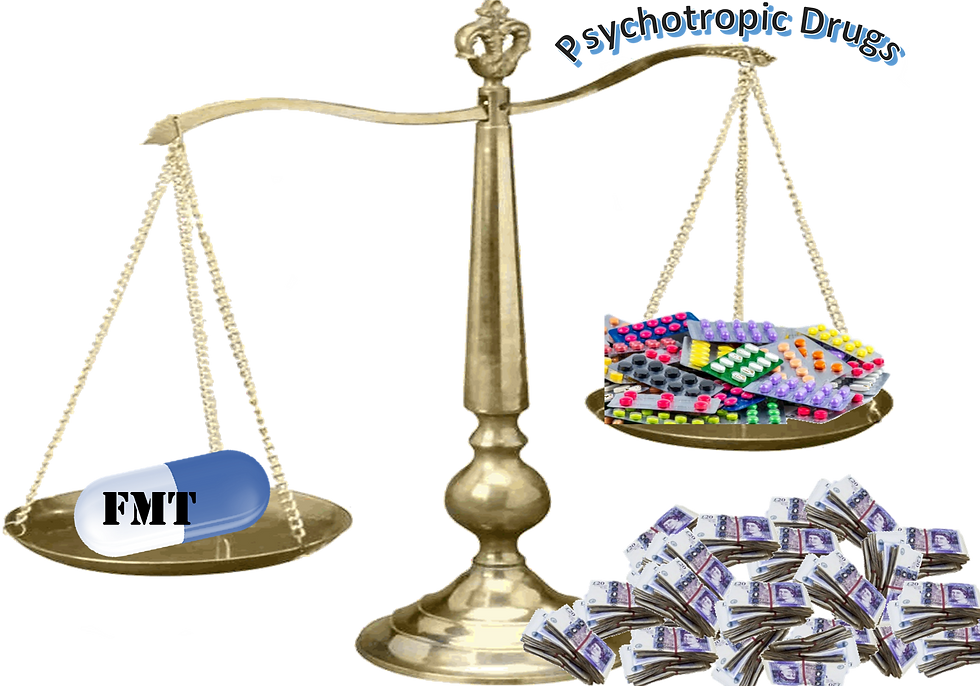Do Mental Health Doctors Only Care about Protocols or do Cures Matter More?
- bob haber
- Jul 17, 2023
- 3 min read
My personal journey as a carer has made me aware of the Mental Health industry here in Perth, Australia. To place in context my wife suffered post-partum psychosis and depression 7 years ago, and since recovering has had x3 psychotic episodes.
As a carer there are x2 routes one experiences with a patient;
(1) Emergency Department- patient admitted by family or ambulance upon suffering wildly irrational behaviours and/or threatening to harm themselves or others
(2) Follow-up visits; periodic appointments to psychiatrists to adjust medications and check recovery status. Patient told they may have to take medication for the rest of their lives which have concerning side effects.
The emergency department psychiatrists tend to be more experienced and empathetic, our experiences with them have been very good. The follow-up visits have tended to be with junior consultants who closely follow protocols- focus mainly on the psychotropic medications and give priority to patient’s privacy to the detriment of not always consulting with the carers (a requirement set out by the Mental Health Act). This is an important shortfall as the carer knows the patient intimately before & after the psychotic episode, and the psychiatrist can easily be misled by delusional patients who have regained some awareness of reality but not fully recovered.
In order to gain an understanding of what I’m dealing with I did some research into the latest findings and potential new treatments on offer in the scientific journals. When I raised x2 of these breakthroughs- such as Dr Chris Palmer’s theory of low carbohydrate diets and FMT’s ability to restore patient’s gut biome and place in remission, it was often met with blank stares and one doctor just did not even want to know as it fell outside of her protocols set by the senior consultant.
The current research is credible and numerous FMT case studies demonstrate patients going into remission (depression, bi-polar, schizophrenia, etc) with no further requirement for medication. Encapsulated FMT (‘capsules’) are the best approach as they are taken orally and have no side effects. FMT was first reported back in 1958 and today is a common effective treatment for Clostridioides difficile. FMT is a well-known ‘drug’, extensively tested and understood. Apparently, if applied to different afflictions then require separate stage 3 trials. Logically this makes no sense for a well understood and tested ‘drug’ that has no side effects.
I sent a letter to the WA Minister for Health; Mental Health for her to advocate the use of FMT. Her Chief of Staff sought advise from the Chief Psychiatrist for Western Australia and her reply includes the following contradictory statement;
“…new and innovative treatments in the management of mental illness are encouraged… FMT is not a standard treatment in the existing guidelines…”
Again, protocols are held in higher regard than curing patients.
MAPS managed to get MDMA through to stage 3 trials for PTSD- it took 35 years and about $100 million. As a carer I cannot wait 35 years for FMT to be approved- schizophrenics have reported suicide attempts of 18-55%, live 15-20 years less and have a twofold increased risk of dementia. Waiting such a long time for FMT, which will place her in remission, is not viable as by this time she may have ostracised herself from all her friends, harmed her kids or me, suffer side effects including becoming grossly overweight, may be dead (suicide) or suffering dementia as a result of long-term psychotropic medication use.
The health system in Australia is heavily reliant on carers for the recovery of medical patients- mental health patients often do not recognise that they are unwell which makes life difficult for family members including kids. Reintegration back into society may not happen, they don’t take their medication as they subconsciously recognise the horrible side effects let alone the large weight gains.
Mental health problems are a major problem as 1 in 5 reports having a mental or behavioural condition, action is required now. USA gave emergency use authorisation in August 2021 for the COVID vaccine, Australia followed 4 days later. I would recommend a similar emergency authorisation use for encapsulated FMT. In contrast to Pfizer’s mRNA vaccine, FMT is a well tested and understood ‘drug’ which has no side effects and is known to place patients in remission. There is more evidence of how FMT works and its benefits than the mRNA vaccine before its approval.





Comments